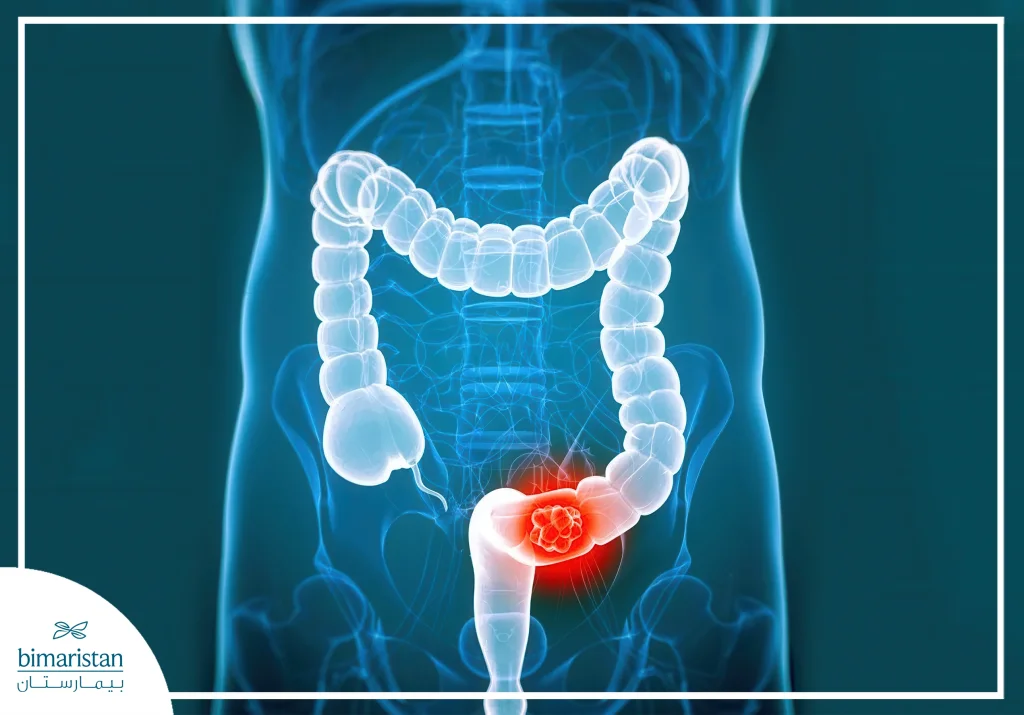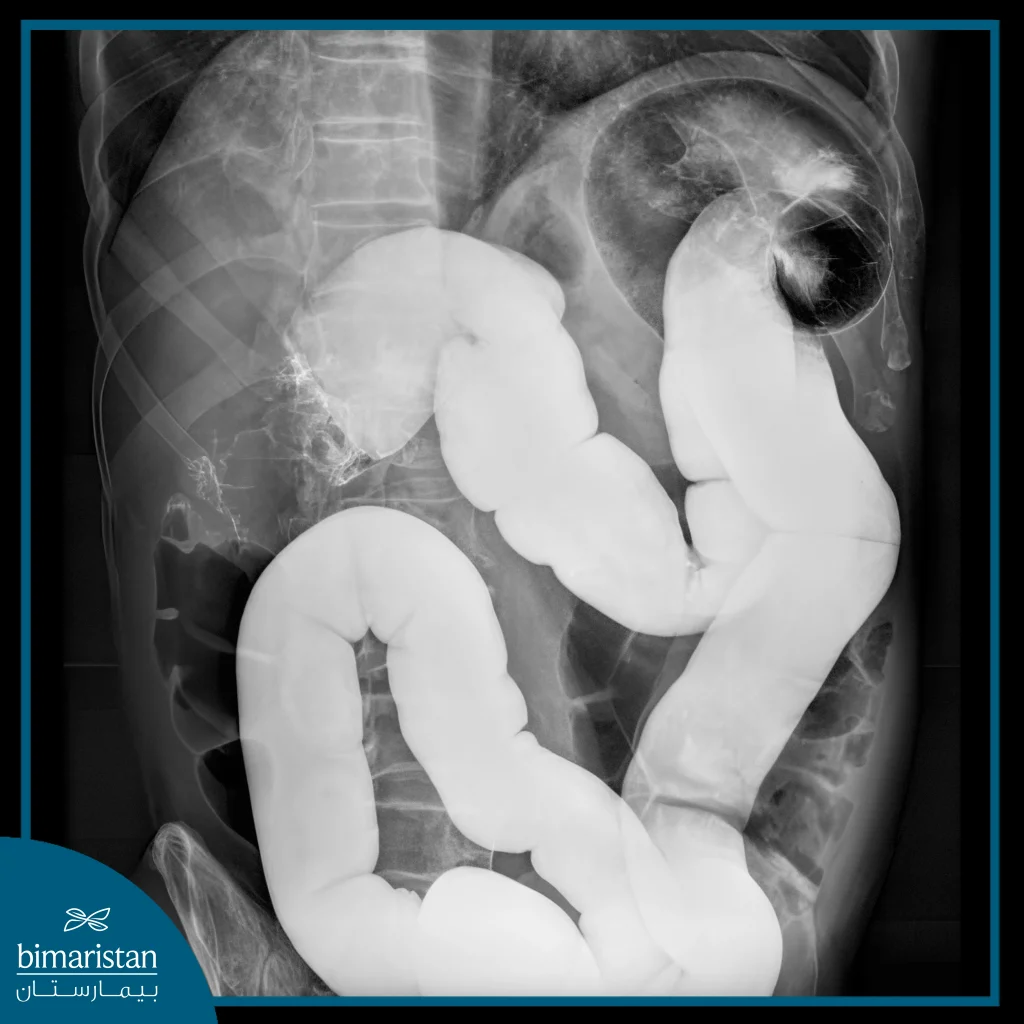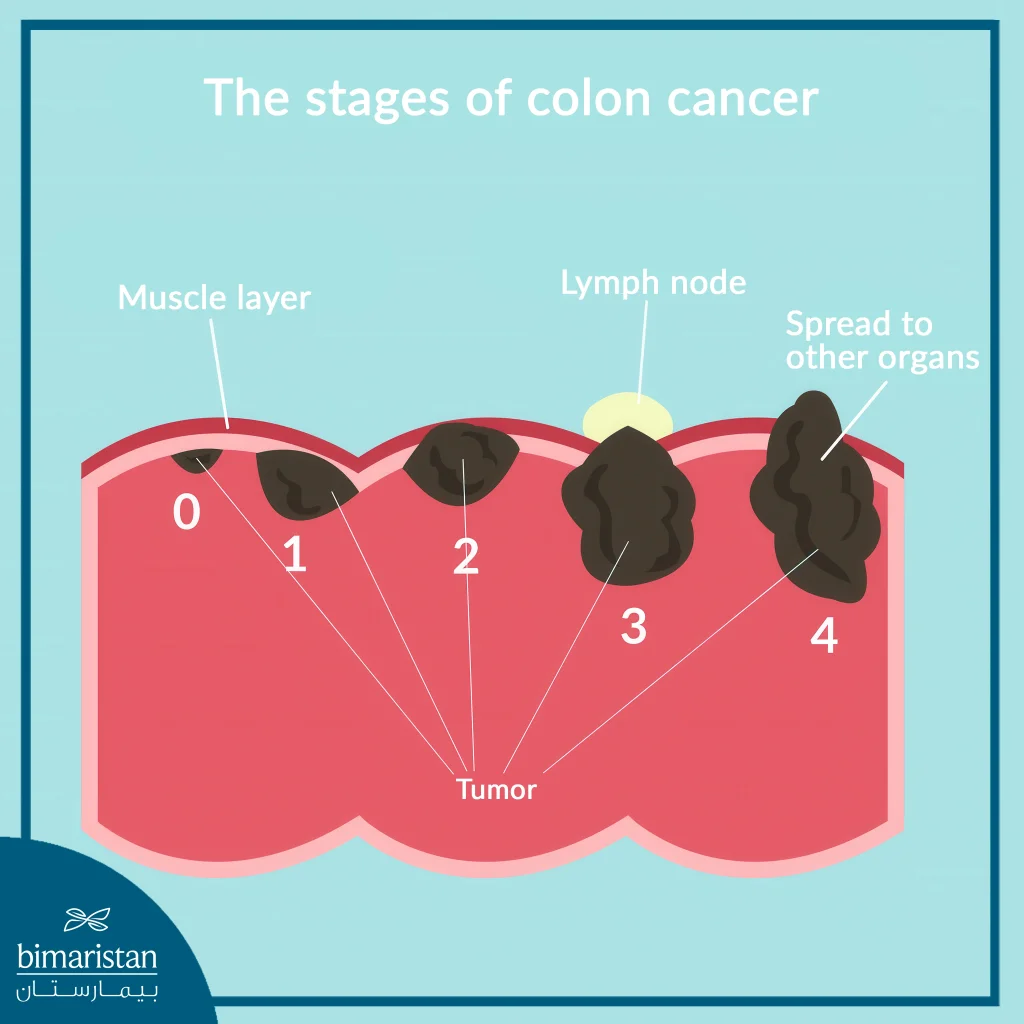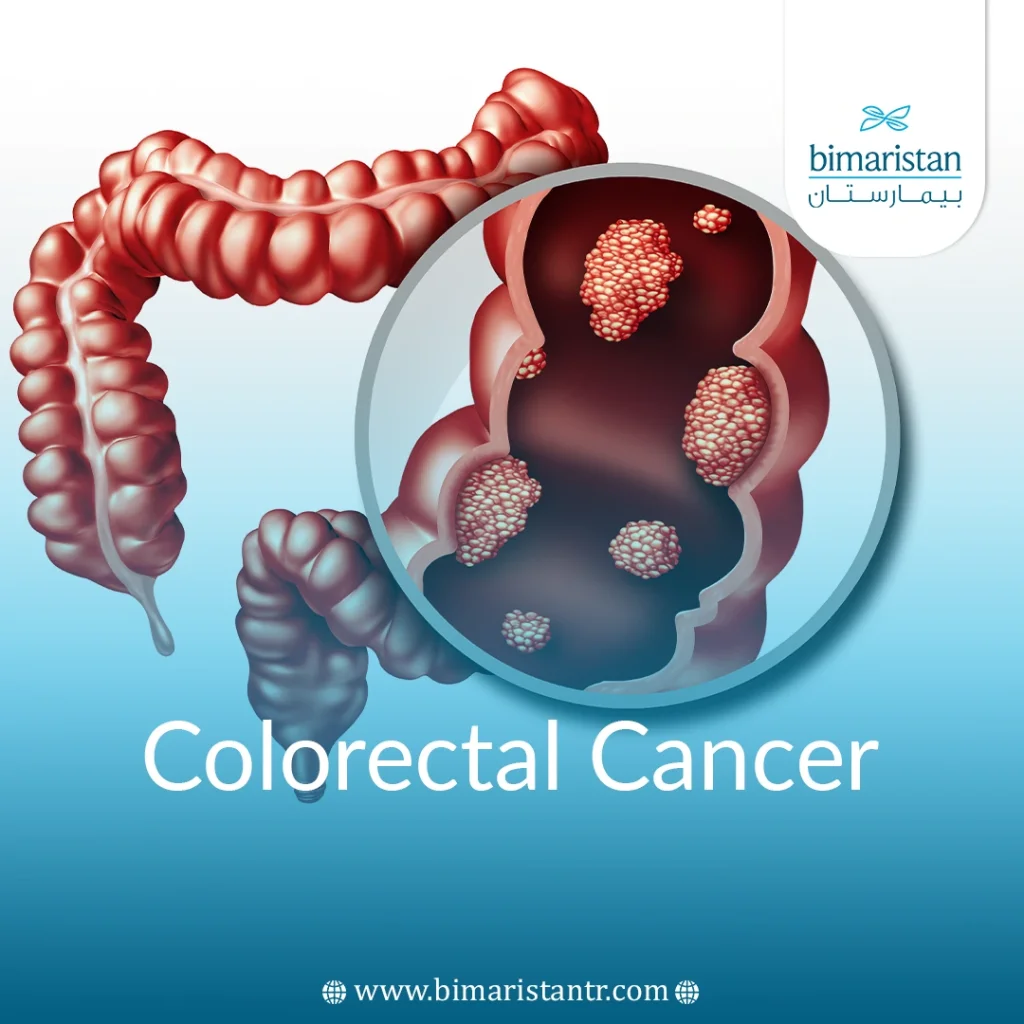Colorectal cancer is one of the most common cancers, especially in men. You can learn about the latest colorectal cancer treatment methods in Turkey/Istanbul.
Colon cancer
Colorectal cancer occurs when the cells lining the rectum or colon become abnormal and grow out of control. Because symptoms often don’t appear until cancer develops, it’s important to have regular checkups to screen for colorectal cancer.
It is the number one cancer in men and the third cancer in women in the world.
What is colorectal cancer?
Cancer that begins in the colon is called colon cancer, while cancer that begins in the rectum is known as rectal cancer. The majority of colorectal cancers generally develop from adenomatous (precancerous) polyps. Some risk factors for colon cancer include a family history of colon or rectal cancer, diet, alcohol intake, smoking, and ulcerative colitis.
Symptoms & Causes
How does colorectal cancer develop?
Fortunately, most colorectal cancers start as benign, small polyps (polyps) but may become cancerous (glandular or serrated). These benign polyps usually grow slowly and don’t cause symptoms until they become large or invade other organs, such as the liver and lungs.
What if I have benign tumors?
There are a variety of colorectal polyps, but colon cancer is thought to arise mainly from specific types, such as adenomatous and serrated polyps, as they are considered cancerous polyps. If a malignant tumor is found during a colonoscopy, it is usually removed, if possible. Polyps removed during a colonoscopy are also examined histologically to evaluate them and to determine if they contain cancerous or precancerous cells. Based on the number, size, and type of cancerous polyps found during a colonoscopy, your doctor will recommend future colonoscopies for surveillance.
What are the signs and symptoms of colorectal cancer?
Unfortunately, some colorectal cancers may exist without any signs or symptoms. For this reason, it’s very important to have regular colon and rectal exams (biopsies) to catch issues early. Common signs of colorectal cancer include the following:
- Change in bowel habits: Constipation, diarrhea, incomplete bowel movements, and incontinence – considered less serious – can be other symptoms of colorectal cancer.
- Blood on the stool or in the feces: One of the most obvious and important signs, blood on or in the stool can be associated with colorectal cancer. However, it does not necessarily indicate cancer because many other diseases can cause gastrointestinal bleeding, including hemorrhoids, anal fissures, ulcerative colitis, and Crohn’s disease…In addition, iron and certain foods, such as beets, can give the stool a black or red appearance, falsely indicating blood in the stool. However, if you notice blood in or on top of your stool, consult your doctor to rule it out.
- Unexplained anemia
- Abdominal or pelvic pain or bloating
- Unexplained weight loss
- vomiting
If you experience any of these signs or symptoms, it is important to consult your doctor for evaluation.
Diagnosis and tests for colorectal cancer
When should colon cancer screening begin?
The American Cancer Society recommends that people at risk for colorectal cancer begin regular screening at age 45. If you have a personal or family history of colon polyps, cancer, or inflammatory bowel disease, you may need to be screened before age 45. Men and women should be screened because colon tumors and cancer affect both sexes.
What if I have a family history of colorectal cancer?
Your doctor may recommend early colorectal cancer screening if you have a family history of the condition.
Some studies have found that having a first-degree relative with colon cancer puts you at two to three times higher risk than someone without a first-degree relative with colorectal cancer. A first-degree relative is defined as your mother, father, brother, sister, and child. The risk can also be higher if you have other people in your family with colon cancer, even if they are not first-degree relatives. They can be grandparents, aunts, uncles, cousins, nieces and nephews, and even grandchildren. Only 10% to 30% of people with the disease have a family history of the disease.
What are the tests for colorectal cancer?
Several tests are used to detect colorectal cancer. Although colonoscopy is frequently recommended, there are other options available. These are the most common screening tests:
- Fecal immunochemical test (FIT): This test looks for blood in feces that cannot be easily seen with the naked eye. This test can be done at home by collecting feces in tubes and studying them in a lab for any blood.
- Fecal occult blood test (gFOBT): This test also looks for occult blood in feces and is performed in the same way. A chemical reaction is used to detect any occult blood. However, the fecal occult blood test is unable to pinpoint the location of the bleeding in the digestive tract. Additional tests will be needed to determine the exact location of the bleeding.
- Fecal DNA testing: A fecal DNA test works by detecting cancerous genetic mutations of tumor cells in the stool.
- Flexible sigmoidoscopy: This is done with a device called a sigmoidoscope to see inside the rectum and descending colon. Unlike the instrument used during a colonoscopy, this device is not as long, limiting the amount of colon that can be seen. During this procedure, the sigmoidoscope is inserted into the anus and up through the rectum and sigmoid colon (s-shaped portion). Gas is pumped during the procedure to allow the doctor the best possible view, and it is often performed without anesthesia. The bowel must be empty for this procedure – this is usually done with the help of a laxative or enema before the test. Small polyps found during the procedure may be removed and tested for the presence of cancers. If these tests are positive, a colonoscopy will be performed.

- Colonoscopy: A colonoscopy is the best procedure to check for polyps or cancer in the colon and rectum. A doctor uses a long, flexible scope (called a colonoscope) to see the entire rectum and colon. During the procedure, polyps can be removed, and samples of lumps, if present, can be taken and sent for histological examination for signs of cancer.
Before the procedure begins, the bowel must be emptied – using a laxative (“bowel prep”). The patient is usually given an anesthetic for this procedure. - Double-contrast (barium) enema: This is an X-ray examination of the colon and rectum where barium is given as an enema (through the rectum). Air is then blown into the rectum to dilate the colon, resulting in an outline on the X-ray. Barium enema is not the most accurate method and is not considered the preferred procedure for colorectal cancer screening. It also requires bowel preparation.

- CT colonography (virtual colonoscopy): In this procedure, also known as a CT colonoscopy or virtual colonoscopy, a CT scan (imaging created using X-rays) of the abdomen and pelvis is performed after drinking a contrast agent. No anesthesia is needed for this test. Like a colonoscopy and barium enema, the colon must be emptied before the examination. If a tumor is found, a colonoscopy must be performed.
How is colorectal cancer diagnosed?
To diagnose, your doctor may order the following tests:
Blood tests (complete blood count, tumor markers, and liver enzymes)
Imaging tests (X-ray, CT scan, MRI, PET, PET/CT, ultrasound, angiography)
biopsy
Diagnostic colonoscopy is considered the first and best option (performed after symptoms appear, not as a routine screening test)
Proctoscopy
Colon cancer treatment

What are the stages of colorectal cancer?
Colorectal cancer is clinically characterized by the stages at which it is detected. The different stages of colorectal cancer are determined by the depth of invasion of the intestinal wall, lymph node involvement, and spread to other organs (metastases). Recovery is highly dependent on early detection.
What is chemotherapy for colorectal tumors?
Chemotherapy refers to drugs that kill cancer cells. These drugs can be given intravenously through an injection or pump or orally as pills.
Chemotherapy is used in the following ways:
Either primary when the colon cancer has already spread to other organs, such as the liver or lungs. In this case, since surgery usually doesn’t eliminate the cancer, chemotherapy can shrink tumor nodules, relieve symptoms, and prolong life.
Or it is given before surgery for some rectal cancers to shrink the tumor and allow the surgeon to remove it better. In this case, the patient usually receives radiation therapy in combination with chemotherapy.
Or adjuvant to kill any of these remaining cancer cells after surgery.
Newer treatments for colorectal cancer include monoclonal antibodies and immunotherapy.
Monoclonal antibodies are created in the lab to find and destroy specific target-in this case-colon cancer cells. Due to their precision, the idea is that treating a tumor with a monoclonal antibody will be more specific than chemotherapy drugs and therefore have fewer side effects.
Some monoclonal antibody drugs prevent tumors from growing the blood vessels needed for their survival, such as vascular endothelial growth factor (VEGF), a substance secreted by cancer to stimulate the growth of new blood vessels. Interfering with the blood supply to a tumor may slow its growth. Others slow cancer growth by targeting a special receptor found on the surface of colon cancer cells. They are often used with or after other chemotherapy drugs for colon cancer that don’t respond to other treatments.
What are immunotherapies for colorectal cancer?
Immunotherapy is a modern method of treatment for colorectal cancer. The goal of immunotherapy is to enhance the patient’s immune reaction to cancer cells to help them fight the disease more effectively. There are two types of immunotherapy drugs: Active and passive. Active immunotherapy aims to stimulate the patient’s immune system. The patient’s antibodies (immune system cells) are manufactured to recognize an abnormal component in the cancer cells and then selectively kill these cells. The vaccine is an example of active immunotherapy and is still being studied.
Passive immunotherapy products are made in a lab to mimic the body’s own antibodies. Passive immunotherapy drugs do not stimulate patients’ immune systems to fight the disease. Instead, these human-made antibodies target specific components in colorectal cancer cells to prevent the cancer cells from escaping the body’s natural immune response.
What are the side effects of chemo and immunotherapy?
The side effects of conventional chemotherapy depend on the drug, its dosage, how long it is taken, and the patients themselves. Because conventional chemotherapy drugs target rapidly dividing cancer cells, they also kill other healthy, rapidly dividing cells in the lining of the mouth, gastrointestinal tract, hair follicles, and bone marrow. The side effects of chemotherapy come from damage to these normal cells.
Side effects of conventional chemotherapy drugs can include:
Nausea, vomiting, loss of appetite, hair loss, mouth sores, skin rashes, diarrhea, easy infections and bleeding, and fatigue due to anemia.
Although it may take some time, most of the side effects related to these medications will disappear when you stop them.
The side effects of monoclonal antibodies depend on the drug. Many of these side effects are similar to those of traditional chemotherapy drugs.
Ask your doctor about the side effects of any medications before you start taking them. If you experience any side effects, tell your doctor. In many cases, these side effects can be alleviated through medications or a change in diet.
Preventing colon cancer
Who is at risk for colorectal cancer?
Although the exact cause of the development of cancerous colon polyps that lead to colorectal cancer is unknown, there are some factors that increase a person’s risk of developing colorectal polyps and cancer. These risk factors are:
- Age: The risk of colon tumors and cancer increases as we age. Colon cancer is most common in people over the age of 50. However, younger adults can also develop colon cancer.
- Lifestyle: You may be at increased risk for colon cancer if you drink alcohol, use tobacco, don’t get enough exercise, and/or are overweight.
- Other medical conditions: Medical conditions (type 2 diabetes, previous history of cancer, history of inflammatory bowel disease) and genetic conditions (Lynch syndrome, familial adenomatous polyposis) can increase the chances of developing colon cancer.
Sources:

